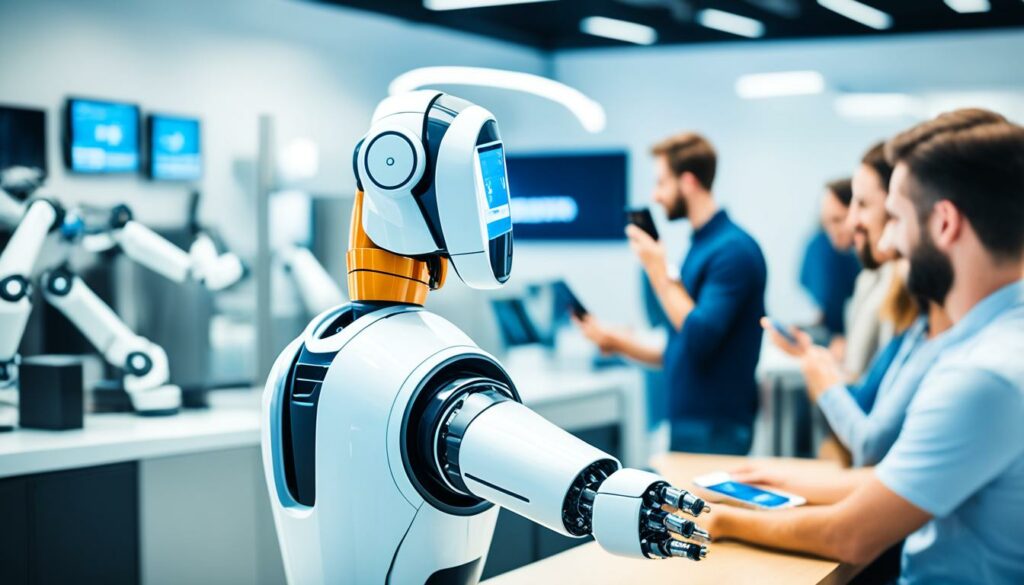Today, about 42% of AI projects aim to make customer experiences better in service, marketing, and sales. Companies are quickly adopting artificial intelligence in customer support. With 71% of customers wanting personal interactions, companies are at a key turning point. Using smart customer service tools like chatbots and virtual assistants is now essential. They change old support systems to meet new customer needs.
There’s a big push towards using generative AI in customer service. Over half of contact center leaders plan to invest in AI by 2025. These smart solutions aim to improve customer interactions and help companies offer better support quickly and without hassle. By tapping into AI’s power, businesses can make their support more timely, efficient, and tailored to customers, building loyalty.
Key Takeaways
- 42% of generative AI initiatives aim to transform customer experience in service sectors.
- 71% of consumers expect personalized interactions, increasing demand for AI in customer service.
- Over half of contact center leaders plan to invest in generative AI by 2025.
- AI tools like chatbots can automate up to 80% of customer interactions, improving efficiency.
- AI solutions provide 24/7 availability, ensuring instant customer assistance anytime.
- Two-thirds of customers express frustration with long wait times in current systems.
- AI can enhance service quality while balancing personalization and data security concerns.
The Rise of AI in Customer Service
Customer expectations have changed, pushing businesses to use AI in customer service. They need to offer support all the time and make interactions more personal. This fits well with the growth of online shopping, where quick answers are key. Old ways of handling customer service can’t keep up with these new demands.
Goldman Sachs says AI could replace 300 million full-time jobs across different sectors. In customer service, companies lose up to 45% of their agents each year. Using AI to automate customer interactions is a good way to keep good staff.
Research shows that 47% of Gen Z will leave a brand after one bad experience. This shows how important AI is in making customers happy and loyal. Most millennials want help right away, and almost all customers like to have the same good service across all channels. Meeting these needs requires new solutions.
Companies using AI are not just solving immediate problems. They’re also changing old jobs into new, more valuable ones. With AI, they can handle lots of data fast and make customer service better. Being able to make experiences more personal helps them stand out.
A study on a bank in Asia showed big changes with AI in customer service. They doubled or tripled use of self-service channels and cut service interactions by 40-50%. This bank saved over 20% on costs, proving AI’s value. McKinsey thinks AI could add $1 trillion a year to global banking.
Understanding Generative AI Capabilities
Generative AI is changing how businesses talk to their customers. It lets chatbots understand complex questions and give smart answers. These AI solutions for customer care make talking to customers better and more personal.
For example, Octopus Energy uses ChatGPT chatbots. These chatbots can do the work of 250 employees. Customers really like them, often more than talking to real people. In fact, 85% of top bosses think generative AI will talk directly to customers in the next two years.
Generative AI can handle lots of questions at once, which is great for businesses. It lets companies free up human workers for harder tasks. Companies like John Hancock have used this tech to make customer support better and work more smoothly.
Using a DAPI approach helps businesses use generative AI well. First, set clear goals and look at customer data. Then, pick the right AI tools. This leads to better, more personal service. Generative AI works 24/7, helping customers all over the world.
By mixing human skills with generative AI, companies can make customers happier. They can learn more about what customers want and grow in a tough market.
AI in Customer Service: Enhancing the Customer Experience
AI is now key for enhancing the customer experience. It helps businesses offer services that meet each customer’s needs. By analyzing data, companies learn what customers like, making their service more personal. A report shows 65% of CX leaders see AI as crucial for customer service today.
Liberty London uses Zendesk AI to understand what customers want and feel. Grove Collaborative shows how AI helps give personalized customer care. This makes customers more engaged and happy, which is vital in today’s market.
Now, 51% of people prefer talking to bots for quick help, showing AI’s growing role in daily life. AI can automate tasks, saving about 220 hours a month. This makes service faster and more efficient, fitting well with companies using AI.
Almost 80% of CX leaders want to spend more on tools to help agents, showing the need for tech that improves enhancing the customer experience. Companies like Home Depot and JPMorgan Chase focus on smooth service across all channels. They know that understanding customer data is key to keeping customers.
AI-driven sentiment analysis is changing how we see customer feelings about brands. It boosts engagement a lot. By knowing what customers have bought before and like, companies can offer better service. This builds loyalty over time.
In conclusion, using AI in customer service makes things run smoother and focuses on enhancing the customer experience. As AI grows, staying on top of trends will shape how we care for customers. This leads to better engagement across all industries.
Chatbot Technologies Transforming Support
Chatbot technologies and virtual assistants are key for businesses wanting to boost efficiency and make customers happier. They can handle lots of questions at once, offering support all day, every day. This means customers get help right away, cutting down on wait times and making their experience better.
AI chatbots can talk to customers in many languages, helping businesses reach out to more people worldwide. This makes customers feel more connected and supported. Plus, with Natural Language Processing (NLP), chatbots can really understand what customers are saying, giving them the right answers.
Chatbots can even figure out how customers feel, thanks to sentiment analysis. This means they can respond in a way that makes customers feel heard and valued. Over time, machine learning makes chatbots better at answering questions by learning from data. Deep learning lets them handle complex tasks like looking at pictures or listening to audio, making them even more useful.
AI chatbots are now often the first thing customers talk to when they need help. They take care of simple questions and give out important info, so human agents can focus on harder issues. The growth of chatbot tech is huge, expected to hit $18.7 billion by 2030. About 58% of B2B businesses use them, showing how popular and effective they are.
Using AI chatbots is changing how companies handle customer service across different fields. They offer help with things like tracking orders, giving product info, and helping with transactions. The benefits are clear: 24/7 support, saving money, making customer interactions personal, and getting useful data from analytics. As chatbot tech keeps getting better, businesses will see more ways they can help and connect with customers.
The Role of Natural Language Processing in Customer Interactions
Natural language processing (NLP) is key to making customer interactions better. It helps connect human talk with AI systems. As companies use AI for customer service, NLP is vital for answering customer questions well. This tech can understand human language’s complexity, making meaningful interactions between customers and businesses.
The North American NLP market is expected to jump from US$29.71 billion in 2025 to US$158.04 billion by 2032. Over the last ten years, machine learning has boosted NLP’s abilities. Now, NLP can do speech recognition, sentiment analysis, and generate language, making chatbots and voice assistants better at talking to humans.
Using natural language processing in customer service brings big benefits:
- Summarizing long documents for quick understanding
- Improving data input accuracy to minimize errors
- Enabling voice assistants to efficiently respond to commands
- Detecting emotions during customer interactions to enhance service
- Automating repetitive tasks via NLP-powered chatbots
Companies using NLP see big improvements. For example, a car rental company found its agents could handle about 50% more calls with Dialpad AI. NLP also cuts down call times by over 10% and lowers abandon rates by 17.36%.
NLP helps analyze what customers feel, giving businesses insights into what customers think. This helps in making better responses and strategies to keep customers happy. NLP can also automate email sorting and answers, saving time and boosting efficiency.
Adding NLP to customer service is crucial for better training and improving knowledge bases with real customer questions. By looking at conversations for important moments, companies can make their customer interactions better, leading to a great experience for everyone.
In short, natural language processing is key to changing AI in customer service. It helps companies communicate better and create experiences that feel personal and responsive to customers.
| Benefit | Description |
|---|---|
| Summarization | Quickly condenses documents for faster comprehension. |
| Accuracy | Minimizes input errors through improved data processing. |
| Emotion Detection | Identifies customer sentiment to tailor interactions. |
| Automated Responses | Streamlines customer interactions via chatbots for efficiency. |
| Conversation Analytics | Analyzes dialogues for insights, enhancing customer service strategies. |
Machine Learning for Customer Service Efficiency
In today’s customer service world, machine learning plays a key role. Companies use machine learning to make their operations more efficient. They analyze lots of customer data to find trends and common issues. This helps them offer better services.
Automation in customer interactions is a big plus. Before, agents often spent a lot of time just summarizing calls. This led to different notes and sometimes mistakes. Now, tools like Amazon Transcribe Call Analytics help agents summarize faster, making them more productive.
Generative call summarization also helps supervisors quickly check on calls. They don’t have to listen to full recordings or read long transcripts. This makes it easier for them to manage quality and give great customer service.
About 86% of customers like to help themselves with self-service options. This shows how important it is to use machine learning and AI well. For example, DNB Bank used a ‘chat-first’ strategy and automated 20% of their customer service. This shows how automation can make things more efficient.
The following table shows how machine learning and AI change service operations:
| AI Tool/Feature | Description | Impact on Efficiency |
|---|---|---|
| Generative Call Summarization | Automates call note-taking and summarization | Reduces agent call time spent on documentation |
| Predictive Customer Analytics | Anticipates customer churn and engages at-risk clients | Improves customer retention rates |
| Agent Assist Technology | Reduces time agents spend searching for information | Leads to faster resolution of issues |
| Voice Chatbots | Enhances experience for users with accessibility needs | Increases service availability and response speed |
Using machine learning for feedback analysis helps companies see what needs work. They can then improve their strategies to better meet customer needs. This leads to more efficient service and happier customers, which is key in today’s market.

Personalized Support Using AI Solutions
In today’s world, personalized support is key as customer needs change. Companies use AI for customer care to make experiences that speak to each person. They look at past customer data to make things better for everyone.
Big names like Amazon and Nike show how well personalized marketing works. They use smart analytics and suggestions to offer products just right for you. This makes customers happier and more loyal to the brand.
AI chatbots are a big part of this. They handle simple questions, support customers all day, and answer fast. This helps human helpers do less work and makes customer service better. AI gets smarter over time by learning from what customers say, making it better at giving personal help.
The future looks bright for personalized support with AI. Companies will keep using new tech like predicting customer needs and feeling what customers feel. As AI gets better, it will make talking to customers smoother and know what they need before they say it.
Automation in Customer Interactions: Benefits and Drawbacks
Automation in customer interactions is key for companies wanting to boost AI in customer service. It brings big efficiency gains and makes things more accessible. AI chatbots can quickly understand and answer questions, cutting down on wait times.
AI works all the time, helping customers no matter the hour. This means people get help whenever they need it, showing a strong service commitment. AI also looks at lots of customer data to give personalized help. This makes the experience more engaging for users.
But, there are also downsides. AI is great at doing simple tasks, leaving humans free for harder, emotional tasks. However, starting these systems can be expensive and tricky to set up.
There’s worry about jobs being lost as some tasks are automated. Finding the right balance between using AI and keeping things personal is key. AI can struggle with complex language and context, showing the need for human help in tough situations. Companies must work on blending AI with human touch to better serve customers.
When using AI for personal chats, keeping data safe and private is crucial. It’s important to be ethical and open in how AI makes decisions. Keeping AI up to date is also key, as it faces its own challenges. Despite this, with about 40% of customer service now using AI, the future looks promising.

| Benefits | Drawbacks |
|---|---|
| Increased efficiency with instant responses | Potential job displacement for human agents |
| 24/7 availability for customer support | High implementation costs for businesses |
| Ability to analyze customer data for personalization | Challenges with understanding complex queries |
| Freeing up human agents for complex issues | Concerns over data privacy and security |
| Handling multiple inquiries simultaneously | Need for continuous training and improvements |
Case Studies of Successful AI Implementation
Many companies have changed their customer service with AI. Each one shows how AI has made a big difference. For example, Klarna uses generative AI success stories to improve customer service.
Klarna has made a big change by using AI in customer service. Its AI Assistant now handles most customer chats. This means the work of 700 agents, making answers faster, often in under two minutes.
Klarna saved more than $40 million a year with AI. It also cut down on repeat questions by 25%. This shows how AI can make customer service better and save money.
Using AI changed Klarna’s work culture. They had to train many employees to accept these new tools. Now, 90% of Klarna’s staff use generative AI every day. This shows how AI can make work more efficient.
AI is becoming more popular in many industries. The chatbot market is growing fast, from $2.6 billion in 2019 to $9.4 billion by 2025. By 2025, 80% of businesses will use chatbots, especially in healthcare and banking.
AI helps businesses save money on customer support. It can save up to 30% of these costs. This shows how AI can make customer service better and help employees do more.
| Organization | AI Tool | Results |
|---|---|---|
| Klarna | AI Assistant | Saves $40 million annually, resolves inquiries in under 2 minutes, reduces repeat inquiries by 25% |
| Market Trends | Chatbots | Global market growth from $2.6 billion to $9.4 billion by 2025 |
| Healthcare Sector | Chatbots | CAGR of 33.1% expected |
| Banking Industry | AI Implementations | CAGR of 29.6% |
Conclusion
AI has changed how we talk to customers, making things more efficient and personal. Experts say 50% of customer support will use AI and humans together soon. This change is big for businesses, focusing on making customers happy with new tools like chatbots.
Chatbots are great because they’re always there to help and know what customers need thanks to data. They’re perfect for companies growing fast or during busy times. These tools help businesses grow and can even solve problems before they start.
But, it’s important to remember that AI can’t replace the human touch. Things like feeling and understanding are still unique to us. So, using AI and people together is key to great customer service.
This mix of tech and human touch will change customer care for the better. Companies that get this will meet customer needs for quick, real, and helpful support. The future is here, and it’s a chance to set new standards for customer service. We must do it in a way that’s fair, secure, and open.
FAQ
What is the role of AI in customer service?
AI is key in customer service by making interactions automatic, giving personalized experiences, and speeding up responses. Tools like chatbots and virtual assistants use AI to help companies meet today’s customer needs.
How do chatbots enhance customer support?
Chatbots make customer support better by giving quick help and cutting down wait times. They use machine learning and NLP to talk like humans and handle simple questions well. This lets human agents deal with harder issues.
What are the benefits of using natural language processing in customer interactions?
Natural language processing lets AI systems understand and answer customer questions well. It makes talking to customers easier by breaking down hard questions. This leads to happier customers.
How can organizations personalize customer support using AI?
Companies can make customer support personal by looking at what customers have done before and how they interact. This helps give customers experiences and advice that fit them better, making them more engaged and happy.
What are the potential drawbacks of automation in customer interactions?
Automation makes things more efficient but might take away the personal touch in service. Customers like fast answers from AI but still want personal help for tough issues. It’s important to mix automated and human support well.
Can you provide examples of companies successfully implementing AI in customer service?
Yes, Sephora and John Hancock are great examples of using AI in customer support. Sephora uses AI chatbots for product tips, and John Hancock works with Microsoft to make customer service faster and more satisfying.
How does machine learning contribute to customer service efficiency?
Machine learning makes customer service better by looking at data and interactions to find patterns and common complaints. This helps companies improve their services and lets human agents focus on the hard stuff, making things run smoother.
What technologies fall under the umbrella of AI solutions for customer care?
AI solutions for customer care include chatbot tech, virtual assistants, NLP, and generative AI tools. These help automate simple tasks, improve communication, and make customer interactions more personal.




